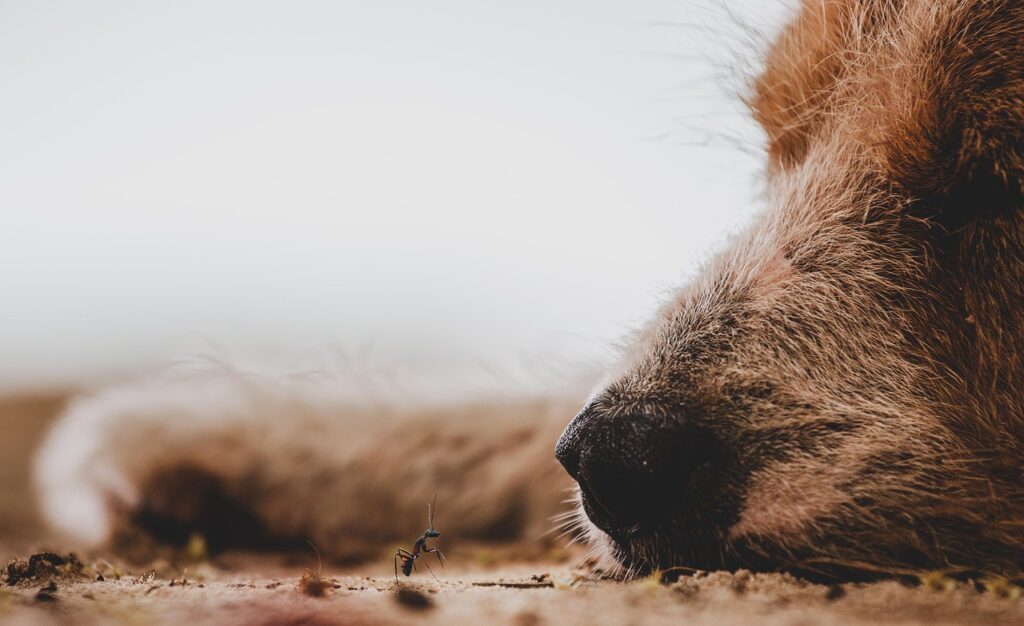Can Dogs Eat Ants? – No, They can’t
It’s not recommended for dogs to intentionally eat ants as these tiny insects may be harmful to their health. While an accidental intake of a few ants may not cause concern, actively allowing your dog to consume them can lead to issues. Ants can bite or sting, which is painful and can cause allergic reactions in some dogs. Additionally, ants might have been exposed to insecticides, which are toxic to dogs.
Can Puppies Eat Ants?
No, puppies should not eat ants. Puppies have more delicate immune systems and may be more affected by the bites, stings, or potential toxins that ants can carry. It’s important always to monitor your puppy’s environment to ensure they’re not ingesting insects that could harm them.
Things to consider when feeding ants to puppies?
Since it has been established that puppies should not eat ants, ensure you keep the puppy’s play areas clean and free from ants. If you notice ants in your home or where your puppy spends time, it is essential to safely and in a pet-friendly manner remove them to protect your puppy’s health.
Nutritional Benefits of Ants for Dogs – Why Dogs can’t have Ants
There are no recognized nutritional benefits for dogs in eating ants. Ants are not considered a safe or healthy snack for dogs and therefore should be avoided.
Potential Allergies: Can Dogs Be Allergic to Ants?
Yes, dogs can be allergic to ant bites or stings. Just as with humans, dogs can have various responses to insect venom. While not all dogs will have an allergic reaction, it’s best to be cautious and avoid exposure.
Symptoms of Ant Allergies in Dogs
- Excessive scratching or licking: If your dog starts to scratch or lick a lot, this might indicate an allergic reaction or irritation caused by an ant bite.
- Swelling or redness: Pay attention to any swellings or red areas, particularly around the paws or face, which may result from a bite.
- Difficulty breathing: Although rare, severe allergic reactions may cause respiratory issues.
What to Do If Your Dog Shows Symptoms?
- Contact your vet: If you see any significant reactions or behavior changes, consult your veterinarian immediately.
- Monitor your dog’s behavior: Keep an eye on your dog after you suspect they’ve had an encounter with ants, and take them to the vet if symptoms progress.
- Keep antihistamines on hand: After consulting with your vet, they might recommend you keep a dog-safe antihistamine handy in case of insect bites.
Recommended Amount: How Much Ants Can a Dog Consume?
Feeding dogs ants is not recommended, so there is no safe amount for them to consume. Should your dog accidentally ingest ants, it is usually not a cause for alarm if it was only a small number. However, monitor them closely and contact a vet if you’re concerned about their reaction.
Things to Consider When Feeding Ants to Dogs
As established, ants are not a suitable food for dogs. If you’re dealing with an ant infestation, consider pet-safe ways to eliminate ants from your home and always supervise your dog’s play areas.
How to Feed Ants to Dogs: A Quick Guide
Dogs should not be fed ants, so there’s no need for a guide on incorporating ants into your dog’s diet. Instead, it’s more valuable to understand how to keep your dog from ants and other potentially harmful insects.
Conclusion
In conclusion, although dogs are curious by nature and may attempt to eat ants, it is not recommended for their diet. Ants can cause health issues for dogs, including allergic reactions and exposure to toxins. Always aim to keep your living environment free from pests and consult your veterinarian for the best ways to protect your pet’s health.



